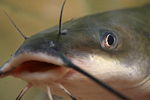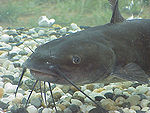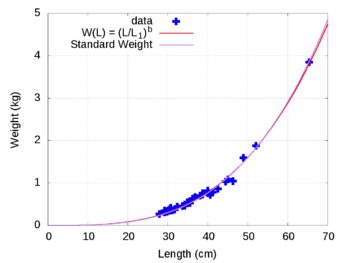- Channel catfish
-
Channel catfish 
Scientific classification Kingdom: Animalia Phylum: Chordata Class: Actinopterygii Order: Siluriformes Family: Ictaluridae Genus: Ictalurus Species: I. punctatus Binomial name Ictalurus punctatus
(Rafinesque, 1818)Channel catfish, Ictalurus punctatus, is North America's most numerous catfish species. It is the official fish of Missouri, Iowa, Nebraska, Kansas, and Tennessee, and is informally referred to as a "channel cat". In the United States they are the most fished catfish species with approximately 8 million anglers targeting them per year. The popularity of channel catfish for food has contributed to the rapid growth of aquaculture of this species in the United States.[1][2]
Contents
Distribution and habitat
Channel catfish are native to the Nearctic, being well distributed in lower Canada and the eastern and northern United States, as well as parts of northern Mexico. They have also been introduced into some waters of landlocked Europe and parts of Malaysia.[3] They thrive in small and large rivers, reservoirs, natural lakes, and ponds. Channel "cats" are cavity nesters, meaning they lay their eggs in crevices, hollows, or debris, in order to protect them from swift currents.[4] In Canada, the species is largely, though not exclusively, limited to the Great Lakes watershed from Lake Nipigon southward.
Characteristics
Channel catfish possess very keen senses of smell and taste. At the pits of their nostrils (nares) are very sensitive odor sensing organs with a very high concentration of olfactory receptors. In channel catfish these organs are sensitive enough to detect several amino acids at about 1 part per 100 million in water. In addition, channel catfish have taste buds distributed over the surface of their entire body. These buds are especially concentrated on the channel catfish's four pair of barbels (whiskers) surrounding the mouth — about 25 buds per square millimeter. This combination of exceptional senses of taste and smell allows the channel catfish to find food in dark, stained, or muddy water with relative ease.
Fishing
Channel catfish are omnivores and can be caught using a variety of natural and prepared baits, including crickets, nightcrawlers, minnows, shad, crawfish, frogs, bullheads, sunfish, and suckers. Catfish have even been known to take Ivory Soap as bait .[5] Another method of catching catfish is using stinkbaits, which are prepared with dead fish, crawfish, garlic, blood, liver, meat, cheese, dough, and even Kool-Aid powder. Sometimes these stinkbaits are prepared into a doughball and mashed onto a hook; other times they are smeared in special tubes meant to hold these baits, and fished slowly on the bottom. Grocery store baits such as chicken livers, shrimp, dog food, squid, and bubble gum will also catch plenty of channel cats.
Juglines, trotlines, limb lines and bank lines are popular methods of fishing for channel catfish in addition to traditional rod and reel fishing. Another method uses traps, either "slat traps" — long wooden traps with an angled entrance — and wire hoop traps. Typical bait for these traps include rotten cheese and dog food. Catches of as many as 100+ fish a day are common in catfish traps.
When removing the hook from a catfish, anglers should be mindful of the sharp spines on the pectoral and dorsal fin.
Length and weight
A member of the Ictalurus genus of American catfishes, channel catfish have a top-end size of approximately 40-50 pounds (18–23 kg). The world record channel catfish weighed 58 pounds and was taken from the Santee-Cooper Reservoir in South Carolina, July 7, 1964. Realistically, a channel catfish over 20 pounds (9 kg) is a spectacular specimen, and most catfish anglers view a 10 pound (4.5 kg) fish as a very admirable catch. Furthermore the average size channel catfish an angler could expect to find in most waterways would be between 2 and 4 pounds.
Channel catfish will often coexist in the same waterways with its close relatives, blue catfish, which are somewhat less common but tend to grow a lot larger (with several specimen confirmed to weight above the 100 lb. mark).
As channel catfish grow longer, they increase in weight. The relationship between length and weight is not linear. The relationship between length (L, in cm) and weight (W, in kg) for nearly all species of fish can be expressed by an equation of the form:
Invariably, b is close to 3.0 for all species, L1 is the length of a typical fish weighing 1 kg. For channel catfish, b = 3.2293, somewhat higher than for many common species, and L1 = 45.23 cm.[1]
Notes
- ^ a b c Length, Weight, and Yield in Channel Catfish, Lake Diane, MI. E. Keenan, S. Warner, A. Crowe, M. Courtney. (2011). Cornell University Library.
- ^ Carlander K.D. 1969. Handbook of freshwater fishery biology, volume 1., The Iowa State University Press, Ames. Iowa.
- ^ Animal Diversity Web, Museum of Zoology, University of Michigan (retrieved 22 Aug 2010)
- ^ Understanding the catfish spawn, gameandfishmag.com
- ^ Off-The-Wall Baits for Persnickety Catfish, gameandfishmag.com )(retrieved 22 Aug 2010)
- ^ R. O. Anderson and R. M. Neumann, Length, Weight, and Associated Structural Indices, in Fisheries Techniques, second edition, B.E. Murphy and D.W. Willis, eds., American Fisheries Society, 1996.
External links
- Froese, Rainer, and Daniel Pauly, eds. (2009). "Ictalurus punctatus" in FishBase. 7 2009 version.
- Salmon, M. H. III (1997). The Catfish As A Metaphor. Silver City, New Mexico: High-Lonesome Books. ISBN 0-944383-43-2.
- Channel Catfish, Ontario Ministry of Natural Resources. Retrieved 22 Aug 2010.
Categories:- Fish of the United States
- Ictalurus
- Animals described in 1818
- Introduced freshwater fish
Wikimedia Foundation. 2010.





